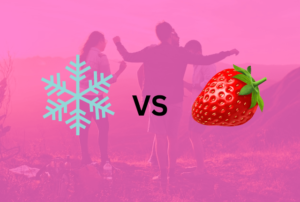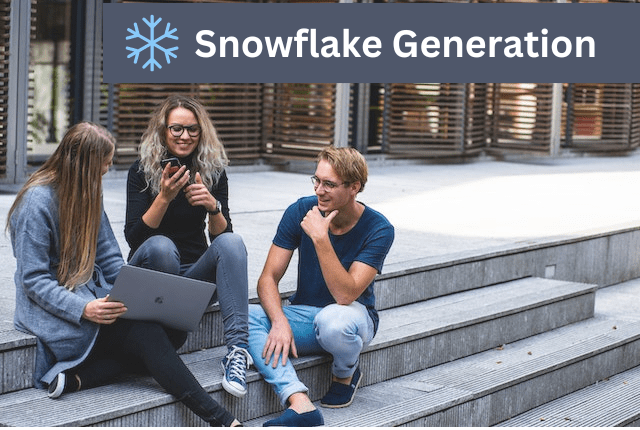In today’s time of rapid technological advancement and constantly evolving cultural norms, a generation has emerged with equally captivating and perplexing nature. They are the “Snowflake Generation,” the Millennials and Gen Z who have come of age in a time of unprecedented change. Often labelled as sensitive, entitled, and reliant on technology, this generation is unlike any that has come before.
But what truly sets them apart? What are the forces that have shaped their values, attitudes, and behaviours? And how can we understand and embrace their unique perspective? Let’s dive in and find answers to these questions.
What Does the Term ‘Snowflake Generation’ Mean?
The cohort of individuals who reached adulthood during or after the 2010s is perceived as having lower resilience and being more inclined to take offence compared to earlier generations. It’s no wonder that the term “Snowflake Generation” has been applied to Millennials and Generation Z. After all, this generation of young people is unlike any that has come before them. They were raised in an era of rapidly advancing technology and globalization, giving them access to more information than ever before.
Now, for those seeking answers to why today’s Millennials are different, several vital characteristics set them apart from previous generations. Keep reading to learn more about why this generation is unique and what it means for the future.
The Theory Behind Snowflake Generation
The term “Snowflake Generation” was first coined to describe Millennials, who have been accused of being overly sensitive and having an entitlement mentality. While this characterization has some truth, it’s essential to acknowledge the underlying factors contributing to this attitude.
The term “Snowflake Generation” was added to the Collins English Dictionary in 2018. It describes people who get upset easily when things don’t go as planned. Millennials, in particular, might react more strongly than older or younger generations if they feel their views aren’t being respected.
In addition, the speed and convenience of modern technology have shaped how this generation sees the world. They’ve grown up with instant access to information on anything they can think of, making them even more demanding to get what they want.
Additionally, the Snowflake Generation’s reliance on technology has caused them to be more socially isolated than other generations. Whereas previous generations would have socialized and interacted with their peers through physical activities or face-to-face conversations, today’s Millennials are often glued to their phones and computers. This has led to greater loneliness and detachment from the real world that older generations may not have experienced.
What Makes the Snowflake Generation Stand Apart?
The Snowflake Generation stands out with a unique blend of traits that set them apart from their predecessors. Let’s explore the key characteristics that shape their worldview and interactions.
Risk-takers in a Changing World
Unlike generations before, the Snowflake Generation isn’t afraid to leap into the unknown. Raised in a world of constant change, they’re comfortable navigating uncertainty and embracing new opportunities, even if it means stepping outside their comfort zone. This boldness fuels their entrepreneurial spirit and desire to make a mark.
Digital Natives, Fluent in Tech
The Snowflake Generation is the first to have grown up entirely in the digital age. Technology isn’t just a tool for them; it’s an extension of themselves. They navigate the online world with ease, using technology to connect, create, and learn. This fluency gives them a distinct advantage in an increasingly digital world.
Transparency is Key
Gone are the days of veiled communication. This generation craves authenticity and values open, honest dialogue. They expect transparency from those around them and aren’t afraid to speak their own truth, even if it challenges the status quo. This directness fosters deeper connections and fosters a culture of trust.
Straightforward Strategies, No Fluff
The Snowflake Generation doesn’t have time for complexity. They prefer clear, concise communication and appreciate straightforward strategies. This no-nonsense approach streamlines decision-making and allows them to focus on achieving their goals efficiently. They value action over endless deliberation.
In essence, the Snowflake Generation embodies a blend of ambition, adaptability, and authenticity. Their unique characteristics shape their interactions with the world around them, challenging traditional norms and paving the way for a new era of transparency, innovation, and purpose-driven action.
The Impact of the Snowflake Generation and the Society

The Snowflake Generation has had a significant impact on society in several ways.
- They’ve been at the forefront of social movements, such as the fight against climate change, and they have brought a greater focus to issues such as gender equality.
- They’ve also been instrumental in pushing for businesses to be more mindful of their environmental impact and the needs of their customers. This has made companies more conscious about how they operate and the ethical standards that they uphold.
- Financially, Millennials have been more cautious about taking on too much debt, leading to less reliance on credit cards and other forms of borrowing. As a result, the world is beginning to see an emergence of more responsible spending habits.
Popular Myths About the Snowflake Generation: How True are they?
Despite their many positive qualities, the Snowflake Generation has been subject to several myths that are not supported by evidence. Let’s see how true some of these myths are in reality:
Lazy and Entitled?
Far from it. Millennials are driven and hardworking, eager to make their mark on the world. They may challenge traditional notions of work-life balance, prioritising purpose and fulfilment, but this doesn’t equate to laziness. They simply seek a life that aligns with their values.
Prone to Violence?
This myth is simply unfounded. Studies consistently show that violence among young people has been steadily decreasing, and Millennials are no exception. In fact, they are often at the forefront of social justice movements, advocating for peace and equality.
Poor Savers and Investors?
While economic realities may present challenges, Millennials are increasingly demonstrating financial savvy. They are conscious of debt, prioritise experiences over material possessions, and embrace innovative investment strategies.
Easily Distracted?
In a world overflowing with information and technology, focus can be a challenge for anyone, regardless of generation. Millennials, however, have developed impressive multitasking skills and the ability to adapt to rapidly changing environments.
Emotionally Weak?
The Snowflake Generation is often criticised for its openness and willingness to express emotions. Yet, this emotional intelligence is a strength, fostering deeper connections and promoting mental well-being. It’s a testament to their resilience in a complex world.
The truth is, Millennials are hardworking, talented, and ambitious individuals who bring immense value to the workforce and society. With the right support and opportunities, they have the potential to shape a brighter future for all. It’s time to move beyond the myths and embrace the reality of this dynamic generation.
Shaming the Generation
If you’ve been reading this article, you might think that most have unfairly judged the Snowflake Generation. But despite the negative stereotypes, it’s essential to realize that Millennials are just like any other generation and deserve respect for their contributions.
Blaming the Society
If shaming snowflakes is inappropriate, looking into the factors that may have contributed to the snowflake generation’s tendencies is essential. Some of these factors include an overall shift in culture, the prevalence of technology, economic instability, and the increasing cost of living.
These are all issues that society needs to address to ensure a better future for all generations. We need to ensure that Millennials have the support and resources they need to succeed in their endeavors, professionally and personally.
Blaming the Previous Generations
It’s also important to recognize the role that previous generations have played in creating the conditions that Millennials are facing today. The Baby Boomers and Gen Xers have left behind a world where technology has changed how we interact, and they have created an economic system that favors those already wealthy.
Fay Weldon, an 87-year-old English author, says to stop mocking Millenials and start looking into what the older generations have done to leave them in their situation, including leaving the generation with high expectations of lovely homes, great jobs, and a comfortable pension.
Is Shaming Legit?
Instead of shaming this generation, we should acknowledge its strengths and work towards creating a better future for them by providing. We should focus on providing a supportive environment, including access to education, job opportunities, and financial stability.
Parenting Styles for Snowflake Generation
As we all know, parenting styles are vital in shaping our children’s future. Parents of Millennials need to recognize that this generation is unique and requires a different approach when it comes to parenting. This includes:
Empowering Autonomy
Rather than dictating every move, parents should guide their Snowflake children towards making their own choices. Encourage exploration, celebrate their successes, and offer support when they stumble. This fosters a sense of self-efficacy and confidence.
Finding Their Voice
This generation values authenticity and expression. Create a safe space for your children to share their thoughts and feelings openly, without fear of judgement. Listen actively and validate their emotions, helping them develop a strong sense of self.
Navigating Challenges Together
Life is full of ups and downs, and the Snowflake Generation is no exception. Dealing with them can be quite the challenge especially when they are down. Be a steady presence as your children face challenges, offering guidance and encouragement while allowing them to learn from their experiences. Foster resilience and problem-solving skills.
A Haven of Safety
Above all, create a home environment where your Snowflake children feel safe, loved, and accepted. This provides a secure foundation from which they can explore the world, take risks, and ultimately blossom into their full potential. Remember, parenting is a journey, not a destination, and adapting to the needs of this generation is crucial for their success and well-being.
Video Credits: TEDx Talks
Snowflake Generation Vs. Strawberry Generation

The term “strawberry generation” refers to the younger generations (Generation Z and Alpha) seen as entitled, demanding, and fragile. The term “snowflake generation” describes Millennials, who are typically ambitious, tech-savvy, and idealistic. Both terms can be damaging if misused, as they can lead to stereotypes and negative assumptions about these generations.
Differences between the Snowflake Generation and the Strawberry Generation:
Snowflake Generation:
Ambitious
They are known to be driven and highly motivated in work and school, aiming for excellence in all their pursuits. This calls for a lot of work, which they’re willing to push through to reach their goals.
Tech-savvy
Now, more than ever, technology is pivotal in communicating and operating. This generation has grown up with this in mind and has been tech-savvy since they were kids. With their knowledge and experience comes a great advantage, as seen in their problem-solving approach.
Idealistic
Having grown up in an ever-changing world, this generation often stands for what they believe is right. This could range from social issues to environmental protection, and their idealistic outlook helps them to stay true to their values.
Strawberry Generation:
Entitled
Many of this generation have been raised believing they can achieve anything if they put in enough effort. This entitlement has caused them to become demanding and expect too much from people, leading to unrealistic expectations. They share many traits in common with durian generation but have their own differences as well.
Demanding
These expectations can be seen in their demand for recognition. They want to be valued and appreciated, and they want the results of their work to speak for themselves.
Fragile
As a result of their entitled nature, this generation can be seen as fragile. They are easily hurt by criticism and quickly give up when things don’t go their way. This can be a problem, as it often leads to an inability to cope with failure and adversity.
How Can We Support the Snowflake Generation?
- We can support the Snowflake Generation by providing access to education, job opportunities, and financial stability. This is essential for Millennials to reach their full potential and create a better future for themselves and society.
- Additionally, we should strive to create an open and understanding environment that celebrates the positive qualities of this generation. By doing this, we can ensure that Millennials feel supported and empowered to impact the world positively.
What are the Benefits of Embracing the Snowflake Generation?
By embracing the Snowflake Generation, society benefits from its ambition, creativity, and passion for change. Millennials are at the forefront of technology, business, and social issues, so supporting this generation can lead to great things for society. Additionally, embracing the Snowflake Generation will create a more diverse and tolerant world that celebrates the unique qualities of this generation. Ultimately, embracing Millennials can help us create a better future for everyone.
Tips on How to Build Strong Relationships With Millennials
Building solid relationships with Millennials requires a different approach than with other generations. Here are some tips on how to build successful relationships with this generation:
- Show appreciation for their unique qualities and talents
- Offer support and guidance when needed
- Connect on a personal level by engaging in meaningful conversations
- Encourage collaboration and open communication
- Adapt to their ever-changing needs
- Help them find purpose and meaning in their lives
By following these tips, we can ensure that Millennials feel valued, supported, and accepted. This will foster strong relationships between generations and build a better future for everyone.
Remedies to Overcome Challenges Facing the Snowflake Generation
The challenges facing the Snowflake Generation are daunting but possible. Here are some remedies that can help overcome these challenges:
- Boost access to quality education and job opportunities
- Provide financial security and stability
- Create an inclusive environment that values diversity
- Offer support during difficult times
- Encourage creative expression and collaboration
These remedies can help create a better future for Millennials and society. By taking proactive steps to support this generation, we can ensure they have the resources, guidance, and support they need to reach their full potential.
FAQs Related to Snowflake Generation
What is the Snowflake Generation Mental Health?
The Snowflake Generation is associated with mental health issues such as depression, anxiety, and loneliness. This can be partially attributed to the higher levels of stress that Millennials face due to increased competition in the job market and rising student debt.
To address these concerns, society must focus on providing better access to mental health resources and programs tailored specifically to Millennials.
What Causes the Shaming of the Snowflake Generation?
The Snowflake Generation is often shamed for their perceived lack of ambition, inability to save money, and reliance on social media. It’s important to remember that these stereotypes are inaccurate and can damage this generation’s mental health. To combat this type of shaming, we need to create a more open and understanding environment that celebrates the positive qualities of Millennials.
What is the Difference Between Snowflake Generation and Other Generations?
The primary difference between the Snowflake Generation and other generations is their attitudes and values. Millennials are often seen as romantic, ambitious, and tech-savvy, while prior generations are seen as more traditional and conservative. However, all generations can learn from each other and use their strengths to create a better future. By understanding the unique qualities of Millennials and finding ways to support them, we can ensure that this generation has the tools they need to reach their full potential.
How is Gen Z Mental Health?
Gen Z is the generation after Millennials, and they face unique challenges regarding mental health. Gen Zers are more likely to experience anxiety, depression, and loneliness due to growing up during the digital age.
To address these concerns, society needs to focus on providing better access to mental health resources and programs that can help this generation cope with the pressure of modern life.
What Period is the Snowflake Generation?
The Snowflake Generation is typically defined as those born between the mid-1990s and early 2000s. This group encompasses Millennials, who are often seen as less resilient and more entitled than prior generations.
Wrap Up!
It is important to remember that all generations, including the snowflake generation, have unique qualities, and there is no “one size fits all” approach to parenting or understanding them. By recognizing the strengths of each generation and finding ways to support their development, we can create a better future for them.










5 Comments